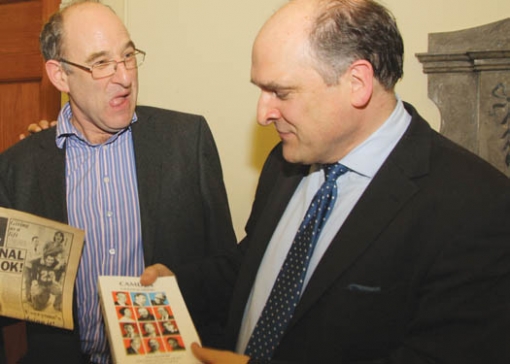Home >> Reviews >> Books >> 2010 >> Apr >> Books: Former Labour councillor Bob Latham's response to Piers Wauchope's book Camden: A Political History
Books: Former Labour councillor Bob Latham's response to Piers Wauchope's book Camden: A Political History

Published: 8 April 2010
HEGEL observed that experience and history teach us that neither people nor government have ever learnt anything from history or acted on principles deduced from it. I apply this adage to Piers Wauchope’s Camden: A Political History.
My decade in Camden politics started in January 1981. Shortly before Christmas, Heart of England Newspapers Limited, without warning or consultation, had given notice to the staff at the Camden Journal.
Camden Labour backed the journalists because we believed in Press pluralism. On January 3 1981, we helped distribute the first edition of Save the Journal. On March 25 1982, we celebrated the success of their struggle with the launch of the Camden New Journal.
We now face an election in which David Cameron has bought Rupert Murdoch’s political support. This comes at a price. While News International plans the expansion of its empire, the BBC cowers in fear.
In March 1982, the district auditor sought to make 31 Labour councillors personally liable for a surcharge of £950,000 arising from the “Camden Supplement”. They had settled the dirty jobs strike with a minimum wage of £60pw. The Tories, having lost the political debate, sneaked to the Ian Pickwell, the district auditor, contending that this was so outrageous as to be unlawful. The High Court concluded that the ratepayer’s watchdog had bitten the wrong leg.
Almost 30 years later, we wait to see whether the Tories now recognise the equity of a national minimum wage. This is surely a benchmark as to whether the most vulnerable will be protected in the difficult years ahead.
There was passion in our politics. We supported the miners as Thatcher used the full force of the State to destroy their communities and their livelihoods. It was better for the miners to have fought and lost, than never to have fought at all.
We demonstrated outside South Africa House when Thatcher decreed that a 24-hour vigil impaired the dignity of the Apartheid regime. We donated our compensation for false imprisonment to the liberation struggle. This was but a gesture compared with the support provided by the Anti-Apartheid movement in Camden. Nelson Mandela has always been generous in his gratitude to the people of Camden.
On December 31 1999, we celebrated the arrival of the new decade in Berlin, under the Brandenburg Gate. We had witnessed a year in which one totalitarian regime after another had been toppled by people power. We still had to pass through Checkpoint Charlie, that remaining symbol of the Cold War. We joined our fellow citizens of Europe as Berliners chipped away at the wall that had imprisoned them for 30 years.
Twenty years later, the Tories have yet to come to terms with our fellow citizens of Europe. Cameron condemns his MEPs to sit with the rump of fascist and racist parties on the European right, the remnants of Europe’s past shame. They are spurned by all the mainstream political parties in Europe.
On January 4 1990, I concluded an article in the New Journal with these words: “Eastern Europe does not seek to be patronised by the West. The people seek a dialogue as to how we can solve our common problems. The greatest is the environmental crisis which can only be resolved by international action. The message for the 1990s is one of hope”.
This is surely the key issue for the elections on May 6 2010.
• Bob Latham is a barrister and a former Labour Camden councillor
• Camden: A Political History. By Piers Wauchope. Shaw Books £14.95
PIERS Wauchope, the former leader of Conservative Party in Camden, has ruffled a few feathers with his history of the borough’s politics.
Released last month, the witty old puffin uses his book, presumably the result of hours, days and months in Holborn Library’s local studies centre, probing the infighting in the Labour Party during more than three decades in power at the Town Hall in King’s Cross.
Labour members in Camden, past and present, also provided him with first-hand accounts of internal rows, although sources are not always identified in the book.
Most people with an interest in the political to and fro can guess at who they might have been.
In this account,
Bob Latham, who like Piers works as a lawyer in his a day job and was once an elected councillor (albeit for Labour), tries to explain how not everybody remembers the power struggles playing out as Piers has it in Camden: A Political History.
Bob and Piers shook hands at the book launch at Hampstead Town Hall a couple of weeks ago.
But after Piers helped himself to the first draft of Camden’s political history, Bob wanted the chance to write the second. As he recalls it.




Comments
Post new comment